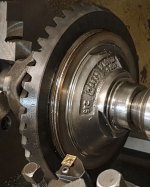Dear All,
I just took off rear diffrential from 2016 BMW 330e for LSD diff install. While I was there I was thinking of having oil drain plug machined to the cast iron casing as it doesn't have one. However I'm having second thoughts as it seems the material thickness is around 7mm. And to machine the surface flat for gasket I assume there will be around 6mm or 1/4 inch left.. Of course there is also possibility for measuring error for the thickness but maybe not more than 1mm. So my question is, is this wall thickness enough for drain plug? Maybe going super careful with small threads like M10 and fine threads..
Thank you in advance
I just took off rear diffrential from 2016 BMW 330e for LSD diff install. While I was there I was thinking of having oil drain plug machined to the cast iron casing as it doesn't have one. However I'm having second thoughts as it seems the material thickness is around 7mm. And to machine the surface flat for gasket I assume there will be around 6mm or 1/4 inch left.. Of course there is also possibility for measuring error for the thickness but maybe not more than 1mm. So my question is, is this wall thickness enough for drain plug? Maybe going super careful with small threads like M10 and fine threads..
Thank you in advance


 ............which of course you won't have to do if it's carbon, BOTOH - as sure as god makes little green apples you will if it's staimless
............which of course you won't have to do if it's carbon, BOTOH - as sure as god makes little green apples you will if it's staimless

 Chip was like red glowing thread. Ok, this is bit offtopic. Sorry.
Chip was like red glowing thread. Ok, this is bit offtopic. Sorry.